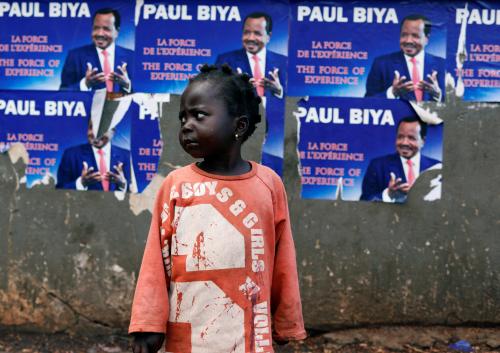Rebel forces take aim at the Central African Republic capital
On Wednesday, January 13, armed rebel groups in the Central African Republic began a coordinated attack on the peripheries of the capital Bangui, before government forces and the United Nations Blue Helmets repelled them, according to the United Nations Multidimensional Integrated Stabilization Mission in the Central African Republic (MINUSCA). The attack was the first near the capital city since the reelection of President Faustin Archange Touadéra in late December. There has been a marked increase in violence since the nation’s six most powerful rebel groups united to stop Touadéra from being reelected after the Constitutional Court rejected the candidacy of former President François Bozizé on the grounds of alleged war crimes. The alliance of rebel groups—which control two-thirds of the country—have vowed to invade Bangui. According to the U.S. Institute of Peace, the ongoing conflict is the most serious threat to the 2019 peace agreement reached between the ruling party and 14 rebel groups.
The violence sparked by the recent elections caused as many as 185,000 Central Africans to flee their homes. Though many have since returned home, the United Nations Humanitarian Affairs Coordination Office estimates that 62,000 people remain newly displaced and as many as 1.3 million displaced overall, half of which are refugees in neighboring countries.
Internal and external conflicts compound in Ethiopia
In recent weeks, tensions between Ethiopia and Sudan over the disputed Al-Fashqa region have flared up, including an attack on Tuesday that left 80 civilians dead, according to Sudan’s Foreign Ministry. The latest violence comes in the wake of fatal attacks in the region last month that killed more than 220 people. The situation is complicated by a multitude of actors, including gangs, which Sudanese officials have claimed are responsible for some of the violence. On Tuesday, Ethiopia indicated that it was losing patience for Sudan’s militarization on the border of the disputed territory. Sudan has blamed Ethiopian military forces for escalating conflict in the region and reported on Wednesday that an Ethiopian military aircraft had recently entered into Sudanese territory.
A new round of negotiations to resolve the dispute over the filling of the Grand Ethiopian Renaissance Dam was short-lived, as the three countries concluded on January 10 without a resolution. In separate statements, Ethiopia and Egypt faulted Sudan for the latest impasse. The statement released by Egypt’s foreign ministry read, “Sudan insisted on the assigning of African Union experts to offer solutions to contentious issues … a proposal which Egypt and Ethiopia have reservations about.” Sudan, however, claims the stalemate stems from Ethiopia’s determination to fill the reservoir with 13.5 million cubic meters of water this year in the face of objections from other countries in the region. “We cannot continue this vicious cycle of circular talks indefinitely,” said Sudanese Irrigation Minister Yasir Abbas.
These tensions continue to mount despite the fragile situation within Ethiopia itself. Last week, a senior Ethiopian military official confirmed that Eritrean troops were indeed present in the country’s Tigray region, which has been the source of infighting for several months. Humanitarians fear that fighting in that region has rendered the local population vulnerable to displacement and food insecurity. Last week, the United Nations expressed in a report the fear that Tigray could also be a source of “massive community transmission” of COVID-19 due to the suspension of health services caused by the conflict.
Ugandan presidential election met with controversy
On Thursday, January 14, Uganda held its presidential election. Although 11 people are standing in the election, the leading contenders for the position are incumbent President Yoweri Museveni, who has served as president for the past 35 years, and opposition leader (and former musician) Bobi Wine. Museveni, age 76, is one of the continent’s longest-serving leaders.
The country has been wrought with tension in the run-up to the election, as Wine (whose real name is Robert Kyagulanyi Ssentamu) and his supporters have been arrested and assaulted numerous times, Wine has claimed that one altercation ended in the death of one of his bodyguards. In fact, in January, Wine filed a petition with the International Criminal Court to investigate claims of human rights violations instigated by the Museveni administration, including at least 76 deaths in November 2020 as security forces responded to riots sparked by Wine’s arrest.
On January 12, Wine tweeted that the private security company guarding his home had been ordered to withdraw by their supervisors. On election day, he claimed in a radio interview that the “army has this morning raided my home, arrested all my security guards and anyone they could see around my premises.” Earlier that day, Wine’s campaign had already begun to complain about “ballot stuffing, vote rigging, intimidation, and threats against media” by the government.
On January 13, the U.S. Embassy in Uganda announced that the U.S. would not be observing the elections as 75 percent of its accreditation requests were denied, and bodies such as the European Union and United Nations have “raised concerns about the integrity and transparency of the election.” The African Union and Intergovernmental Authority on Development (IGAD) have sent observers. The day-of polls are reported to have gone smoothly, though some polling stations were forced to switch to a manual register when their biometric voter identification machines went down.
In the days ahead of the vote, Museveni announced that the government would be shutting down social media, accusing Facebook and similar platforms of unfairly supporting the opposition as they took down accounts tied to the Museveni campaign, which the social media companies claimed were coordinating an attack against public debate. On election day itself, the country implemented a nationwide internet blackout.
As of this writing, no winner has been announcement but, on Friday morning, the electoral commission put out a statement saying that, with just under half the votes counted, Museveni held 62.7 percent to Wine’s 29.3 percent. However, Wine maintains confidence in his win, stating, “We secured a comfortable victory. … I am very confident that we defeated the dictator by far.”
For more on the dangers of third-termism, see John Mukum Mbaku’s recent blog, “Threats to democracy in Africa: The rise of the constitutional coup.”





Commentary
Africa in the news: Central African Republic, Ethiopia, and Uganda updates
January 16, 2021